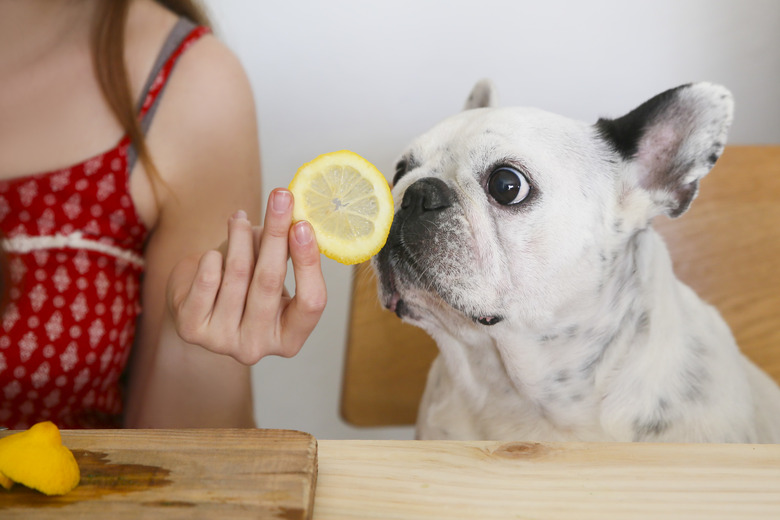What Are The Benefits Of Lemon Juice For Dogs?
If you give your dog lemons, chances are that she won't want to make lemonade. In fact, many dogs despise the scent and taste of citrus. However, there are benefits to using lemon for dogs, which is rich in vitamin C and promotes healthy cell generation. The key is to keep your dog away from the lemon tree itself, and remove all of the peel and seeds, properly dilute the fruit, and make sure the benefits outweigh your dog's look of disgust.
Lemon juice for eyes
Lemon juice for eyes
If you've ever squirted lemon juice in your eyes while squeezing a wedge of the fruit into your beverage, you might be tempted to avoid lemons. However, properly diluted lemon juice can be an effective remedy for eye infections in dogs. Consult your vet if your dog's eye condition does not improve in two to three days.
Before using lemon for a dog's eye, make sure it's an infection and not pink eye, as the remedy is useless against conjunctivitis. Yellow or green discharge from the eye is a key way to tell that what your dog is dealing with is an infection.
Mix four to five drops of freshly squeezed lemon juice with 2 tablespoons of distilled or previously boiled (and cooled) water. Use an eyedropper or cotton ball to put two to three drops in each eye twice a day. You can also moisten a cotton ball with this solution to help fade tear stains.
Weight loss and bellyaches
Weight loss and bellyaches
Add lemon's anti-bacterial and anti-fungal properties to honey — another anti-microbial — in a honey and lemon remedy that can settle your pet's stomach and help promote weight loss. The glucose in honey can help your ailing dog's energy level. However, don't use honey for puppies because their immature digestion can get disrupted by botulism spores in honey.
Add 1 teaspoon of honey and 1 teaspoon of freshly squeezed lemon juice to a cup of warm water and allow your dog to sip it as desired. Make sure fresh, pure water is available at all times as well.
Sweeten doggy breath
Sweeten doggy breath
Using diluted lemon juice can help your pup's doggy breath. Squeeze a lemon wedge into your pet's water bowl. Take care not to let seeds or pieces of peel float in the water, as these contain substances that can cause your pet to feel nauseous and can be mildly toxic.
Make sure your dog is consuming enough water. If the water is too sour for your dog, he won't drink enough. That can lead to dehydration and other health problems.
Easy pest repellent
Easy pest repellent
Make an easy spray-on repellent from the fruit of the lemon. Combine the juice of six lemons with a quart of water. Bring it to a boil and then turn off the heat and let it steep for an hour. After it's cool, strain it into a spray bottle.
Be careful when spraying it near your pet's eyes. The formula is safe to use on your own skin too. Avoid using lemon or lemon eucalyptus essential oil to make your spray because these can be toxic to your dog.
Train your pup
Train your pup
Teach your pooch not to jump on furniture by spritzing the fabric with lemon spray. Add a teaspoon of lemon juice to 1.5 cups of water in a spray bottle and use the solution to mist your furniture. The spray adds a fresh lemony scent to the room and will discourage your pet from climbing on the furniture.
Toxicity of lemon for dogs
Toxicity of lemon for dogs
If you get your lemons from a tree in your yard, make sure your dog can't access it if she is a chewer. A lemon tree is toxic to dogs except for the flesh of the fruit.
Use only the fleshy part of the fruit, being careful to remove all peel and seeds. These parts contain psoralens, an irritant that can make your dog itchy and flaky if you use these parts in a skin spray. Your pet could also suffer from gastrointestinal upset, such as vomiting and diarrhea. Although symptoms are not usually life-threatening, it's best to check in with your vet if your dog has consumed any part of the fruit or plant other than the fruit pulp.
References
- Animal Wised: Top 10 Smells Dogs Hate
- American Society for the Prevention of Cruelty to Animals: Lemon
- Dr. Winnie's Dog and Pet Care Advice: Home Remedies for Dog Eye Infection
- Dr. Winnie's Dog and Pet Care Advice: Honey for Dogs. Can I give my Dog Honey?
- Dr. Winnie's Dog and Pet Care Advice: How to Get Rid of Bad Dog Breath – Home Remedies, Choosing Right Food
- American College of Healthcare Sciences: How To: 4 Unique Uses for Lemon in the Home
- Animal Humane Society: Pet-Friendly Mosquito Repellents (That Humans Can Use Too)
- North Carolina State Extension: Citrus x limon


